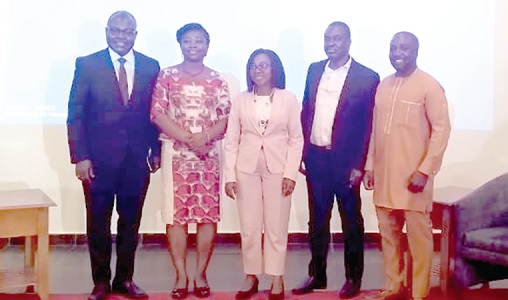
Scientists seek input into charter to transform research, innovation
Scientists are seeking inputs into a draft charter which when finalised, will have the potential to transform the research and innovation landscape in the country.
The move forms part of measures to evolve an inherent culture and natural orientation of the research and innovation ecosystem towards standardisation, certification and conformity assessment.
The draft charter seeks to create a symbiotic relationship among product developers, service providers, innovators, researchers, regulators, researchers and other critical industry players, to assure quality, safety, and to a larger extent, interoperability in research and innovation.
Presenting the draft charter at a workshop in Accra yesterday, an Associate Professor at the Kwame Nkrumah University of Science and Technology (KNUST), Prof. Marian Asantewah Nkansah, said Ghana’s research and innovation ecosystem was vital to drive economic growth, create jobs and improve the quality of life.
The workshop, organised by the Heritors Labs Limited in collaboration with the Council for Scientific and Industrial Research (CSIR), was on the theme: “Advancing Standards and Certification in Research and Innovation: Building a Symbiotic Relationship with Regulators and a Culture of Standards among Researchers and Innovators”.
It brought together researchers, industry, service providers, innovators, academia and policymakers to discuss and brainstorm ways to strengthen and promote the culture of standards in the research and innovation ecosystem.
She indicated that significant strides towards building vibrant research and innovation ecosystem that supported the development of globally competitive products, services and processes had been made over the years.
That, she said, had been made possible through various government policies and initiatives, including the Ghana National Science Technology and Innovation Policy (2010-2015) and the Ghana Shared Growth and Development Agenda (2010-2013).
She explained that there was the need for an ecosystem supported by a robust standardisation, certification and conformity assessment system.
Prof. Nkansah added that although the government recognised the importance of standardisation, certification and conformity assessment, there was the need to do more to ensure that the system was effective, efficient and responsive to the needs of stakeholders.
Adherence to national and international standards
The Deputy Director-General of CSIR Ghana, Prof. Marian Quain, said CSIR was the leading research and innovation organisation in the country with the vision to use the transforming power of science, technology and innovations for wealth creation.
She said the mission was to become the force for accelerated social and economic development in Ghana by examining, exploring and creating science and technology as catalysts for public and private wealth creation.
She explained that adherence to standards and certification were, therefore, critical to ensure quality and acceptance of the results generated from research and innovations.
For his part, the Chief Executive Officer of Heritors Labs, Derrydean Dadzie, expressed the hope that the charter would reshape the research and innovation landscape as well as communities, build a strong foundation for a sustainable trajectory of defacto standards, certification and conformity assessment embedded in products and services produced by researchers.
“Embracing standards, certification and conformity assessment brings an array of benefits to our ecosystem and sets a benchmark for product quality and ensures that our innovations compete on a global stage.
As we strive to make our mark in international trade, conformity to these benchmarks enhances the competitiveness of products originating from Ghana, establishing a reputation for excellence and reliability in the global market,” he said.
Creating wealth
The Director-General of the Ghana Standards Authority (GSA), Prof. Alex Dodoo, said the draft charter was a timely one because achieving a resilient economy required adherence to national and international standards.
He explained that as a country there was the need for an aggressive industrialisation approach with a focus on good quality products, processes, practices and tools for local consumption.
“To achieve the Ghanaian dream, academia, researchers, innovators and industry must work with the Ghana Standards Authority and researchers to create wealth,” he added.